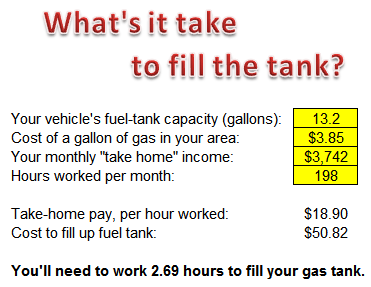I mean, "How many hours do you have to work to fill your car's tank?"
There's a calculator at CNN/Money that's supposed to answer this question. But it seems a bit too optimistic — it doesn't appear to factor for taxes, for one thing. Or any other paycheck deductions. Those are pretty serious items to leave out, methinks.
(Heck, it told me I only had to work 1.3 hours to fill up our Accord's tank. No way can that be correct.)
So I built my own Excel spreadsheet to (hopefully) answer the question more realistically:

There. I'm much more confident of that figure. In our case, at least 2.69 hours of work would be required to top off the Accord. And with my Nissan truck, which has a slightly smaller capacity, it'd take a bit over 2.3 hours of work.
Pricing by "Hours Worked"
Figuring out any item's price in terms of "hours worked to purchase it" is a pretty good metric. (Joe Dominguez' tremendous book Your Money or Your Life (review) was the first to introduce me to this idea.) In the case of fuel prices, it's a good "hardship metric." Gas priced at $4 per gallon would generally be much more of a hardship for someone earning $10 per hour than it would for someone whose time is valued at $25 per hour. Of course, if that $10/hour person is debt-free, but the $25/hour person is leveraged to the gills ... well, that can change things a wee bit, can't it?
And yes, take-home pay matters much more than does gross income, which is what the CNN/Money calculator appears to use. I don't know about you, but I talk to very few souls who get to use their gross income to pay at the pump.
Labels: Automobiles, Spending, Spreadsheets


